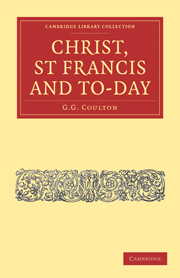Summary
IN my first lecture, I pleaded that we should not deny the name of Christian to any follower of Christ. In the second, it was necessary to plead for a far greater concession; that the question of what St Gregory calls corporeal miracles should be so far subordinated to the spiritual miracle of Christianity as to remove one of the most important obstacles to religious unity. In the third, it became necessary to distinguish between purely historical grounds for belief in physical miracles (which in the nature of the case must be slight) and moral grounds, which are certainly much stronger, but on the other hand much more subjective; so that our own personal belief gives us much less justification for insisting, as a primary condition of fellowship, that others should believe with us. Here, again, there seems a reason for suspension of judgment, if only in the spirit in which trade-unionists have suspended theirs. But you will see that, hitherto, I have pleaded only with each individual, asking him to make these concessions out of individual charity, if not as a matter of individual necessity. To this, however, it may be answered, and very truly answered: ‘we are not merely individuals, we are part of a church. Just as we are necessarily forbidden, for reasons of higher national interest, to make individually what might otherwise be harmless concessions to individual Germans, so also, until the church and the world have fought out their long fight, the church justly forbids us to fraternize with the world on the basis of any concession of principle, however momentary or conditional.’
- Type
- Chapter
- Information
- Christ, St Francis and To-day , pp. 58 - 79Publisher: Cambridge University PressPrint publication year: 2010First published in: 1919

